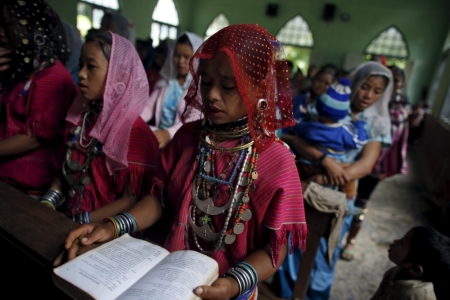Myanmar: 7,000 Kachin Christians Forced to Flee Their Homes as Violence Escalates

Almost 7,000 people belonging to the largely Christian minority group in Kachin, northern Myanmar, have fled their houses since fighting between the army and a rebel group flared up in early April, according to recent figures from the Red Cross.
"It's a war where civilians are being systematically targeted by members of Burma Army ... [yet] the international community chooses to overlook it," political analyst and writer Stella Naw told the UK's Guardian newspaper [on Monday], with international attention on Myanmar focused on the humanitarian crisis facing the country's Rohingya Muslims.
Thousands of lives have been lost and at least 120,000 people have been displaced in the decades-long conflict between the army and the Kachin Independence Army since the military seized control of the country in 1962.
"It is an invisible war," said San Htoi, the joint secretary of Kachin Women's Association Thailand. She told the Guardian that on a recent visit representatives of the United Nations Security Council went only to Rakhine state and "left the country without knowing [about Kachin]."
And according to Thomas Muller, an Asia analyst for Open Doors International, a charity that supports Christians who live under pressure for their faith, it is unlikely the situation will garner more attention "since Myanmar is increasingly coming under economic and political influence from China, its big neighbor."
"China tacitly supports the large Wa minority in Myanmar, and can effectively veto any inquiry into the situation of any minority, let alone any improvements or measures to bring the civil war to an end," Muller added.
Following the bombing of a mission school in the state on Saturday, Hkun Htoy Layang of Kachin Relief Fund told Christian Solidarity Worldwide, "It is outrageous that the Burma army targets a Kachin Baptist mission school. We are very concerned that the Burma army is targeting more civilians throughout Kachin State, with impunity."
Trapped in a Warzone
Yanghee Lee, the U.N.'s human rights expert for Myanmar, raised alarm over the increase in violence in Kachin in her March report to the Human Rights Council.
Last week she called for an immediate end to the fighting, saying, "What we are seeing in Kachin state over the past few weeks is wholly unacceptable, and must stop immediately. Innocent civilians are being killed and injured, and hundreds of families are now fleeing for their lives."
Internally displaced people gather at a church in Myitkyina, Kachin state's capital, on 10 May.
More than 400 displaced civilians arrived in Kachin's capital city, Myitkyina, last Wednesday, where there were already more than 4,000 other displaced people, a Red Cross spokesperson told Radio Free Asia.
Many of them have traveled long distances on foot, making their way through the forest, and ending up seeking help at local churches or existing camps for internally displaced people. Others are staying with relatives.
"The local churches are doing their best to accommodate [those] fleeing from the warzones," a local source told World Watch Monitor on condition of anonymity. "They also donate food and other materials as much as they can to help [but] prices of commodities [have gone] up to five times the usual price."
Many other displaced civilians are still stranded in the forest or have become trapped in the warzone, hiding out in the jungle without food or water, or unable to leave their villages, according to local newspaper The Irrawaddy.
According to World Watch Monitor's source, "Civilians in the warzone are threatened to leave their house or be killed; many houses are burnt down by the government soldiers."
Meanwhile a coalition of humanitarian groups in Kachin told AP that international aid shipments had been blocked by the army and that United Nations agencies and international humanitarian groups had been denied access.
The military restrictions on aid also make access to food and clean water in the camps difficult, according to AP.
The Irrawaddy reported that state-government officials had started rescue operations to help people trapped in the warzone, after more than 300 Kachin youths, joined by an estimated 1,000 other local residents, organized a sit-in protest in Myitkyina last week, calling for the government to act.
The youth movement's leader, 25-year-old women's rights champion Sut Seng Htoi, told Reuters: "People lost their trust in the State Counsellor Daw Aung San Suu Kyi because the people from the whole country elected the NLD [National League for Democracy], the civilian government, to avoid wars and fighting."
In November last year, Myanmar's Christians expressed hope that the visit of Pope Francis would help bring an end to ethnic conflict in the country, but progress stalled despite a new round of peace talks being announced during his visit.
Background
Majority-Buddhist Myanmar is made up of eight major and eight minor ethnic groups, each of which hoped for autonomy after Burmese independence 70 years ago, but some of the world's longest-running civil wars still continue there.
Christian encyclopaedia Operation World calls Myanmar "a deeply fractured nation on a political and especially ethnic level." The conflict zones along the country's borders are where most of Myanmar's Christians live, including the Kachin and Karen ethnic minorities, who have faced years of government oppression.
Christian charity Open Doors International estimates there are more than 4 million Christians in Myanmar, constituting 8 percent of the total population. Most of them live in Kachin, where 85 percent are estimated to be Christians, and northern Shan State.
A 17-year ceasefire between the KIA and the Tatmadaw (the combined forces of Myanmar's army, navy and air force) collapsed in June 2011, since then more than 120,000 people in Kachin state have been displaced.
Myanmar is 24th on the 2018 Open Doors World Watch List of the 50 countries where it is most difficult to live as a Christian.






















